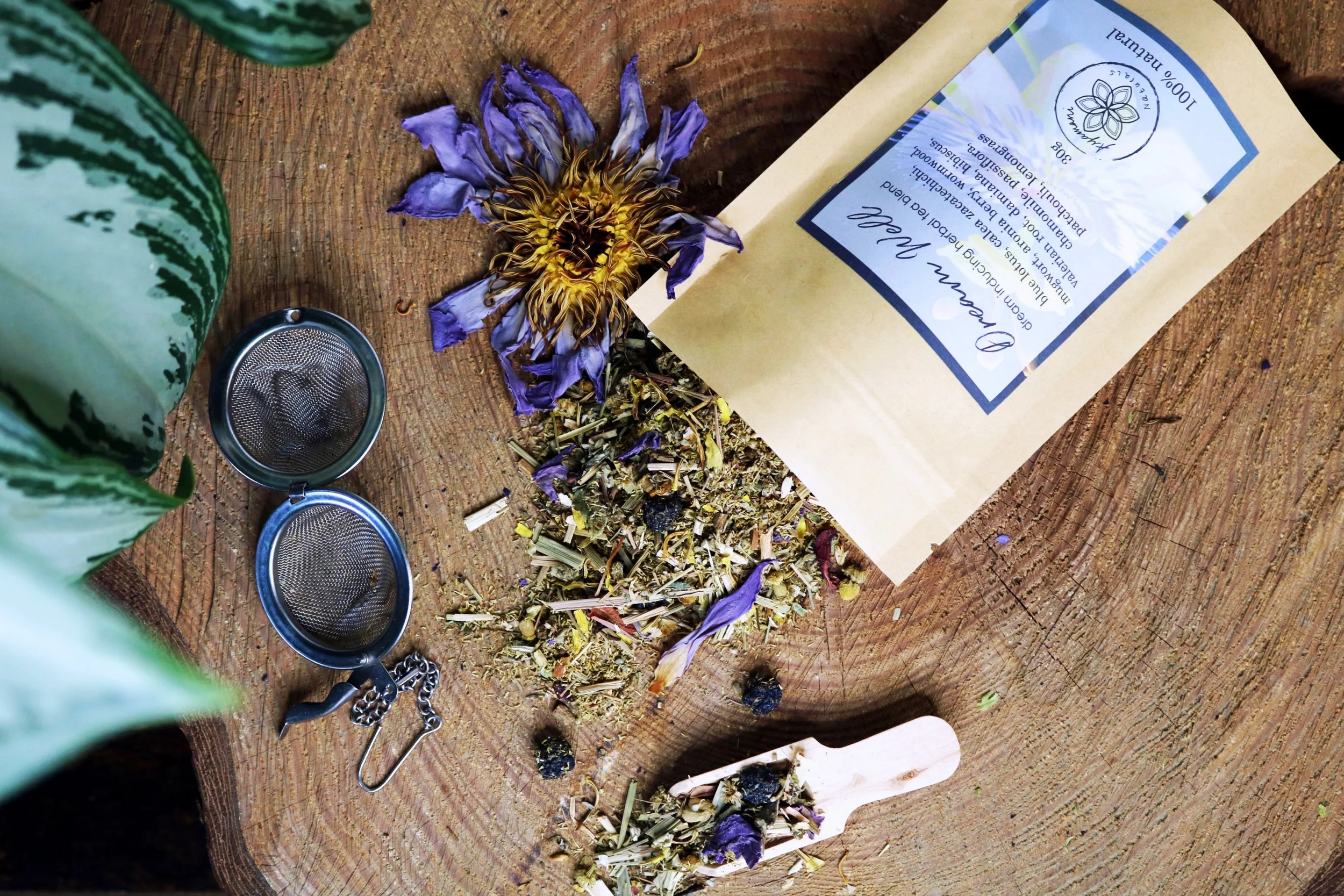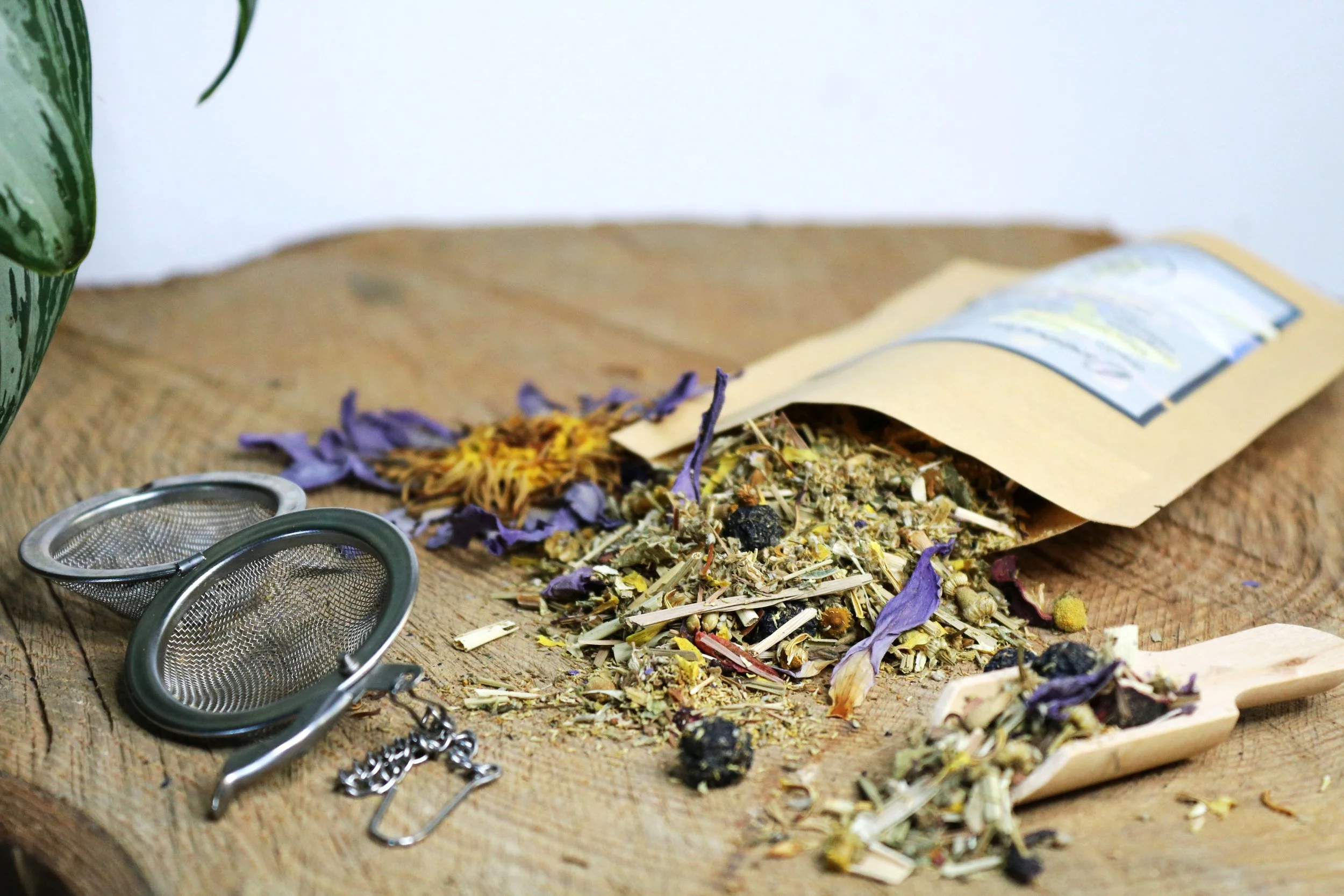Nature's Dreamweavers: Best Oneirogenic Herbs for Lucid Dreaming, a Psychonaut's Essentials Guide
Dreams have captivated the human imagination for millennia, serving as a bridge between the conscious and subconscious mind. Many cultures view dreams as sacred—spaces for insight, creativity, and even spiritual communication. Over time, people have turned to specific plants known as oneirogenic herbs to enhance their dreaming experiences.
Derived from the Greek word oneiros (dream) and genic (creation), these herbs are believed to support vivid, memorable, and sometimes lucid dreams. Whether through teas, tinctures, or smudging rituals, these plants have long been used by shamans, mystics, and dreamers across cultures to unlock the mysteries of the dream world.
In recent years, the fascination with lucid dreaming—where the dreamer becomes aware they are dreaming and can potentially influence their dreams—has brought these herbs into modern consciousness. From enhancing dream recall to deepening relaxation, these plants are treasured allies for anyone looking to explore the transformative power of dreams.
The Wonders of Dream Herbs
Many oneirogenic herbs, featured as key ingredients in Ayamani Naturals' Dream Well tea, have fascinating histories and active compounds that contribute to their dream-enhancing properties, specially chosen for this very purpose.
Blue Lotus (Nymphaea Caerulea)
Blue lotus is a flower steeped in mystery and reverence, dating back to ancient Egypt. Renowned for its mildly sedative and euphoric effects, this herb helps to calm the mind and body, creating a peaceful state conducive to dreaming. The active compounds in blue lotus, such as nuciferine and aporphine, are believed to promote relaxation while subtly enhancing dream clarity and vividness. Its dreamy, floral aroma adds a touch of sacred serenity to your nighttime ritual.
Calea Zacatechichi (Dream Herb)
Known as the “dream herb” and celebrated in Mesoamerican traditions, calea zacatechichi has long been used to enhance dream recall and intensify dream clarity. The indigenous Chontal people of Mexico consider it a bridge to the spirit world, drinking it as tea or burning it for ritual use. Despite its strong bitterness, it is highly regarded for its powerful ability to stimulate lucid and vivid dreams. This herb is ideal for those who want to actively engage with and remember their dreamscapes.
Mugwort (Artemisia Vulgaris)
Mugwort has a rich history as a dream-enhancing herb in European, Asian, and Native American traditions. Often associated with psychic protection and intuition, it’s used to stimulate vivid dreams and improve dream recall. Mugwort is thought to work by promoting REM sleep, the dream-heavy phase of the sleep cycle. Its earthy, slightly resinous flavor is grounding, helping to create a connection between your waking intentions and the dream world.
Valerian Root (Valeriana Officinalis)
Valerian is widely known as nature’s tranquilizer, used to ease stress, calm an overactive mind, and promote deep relaxation. While not directly oneirogenic, its ability to encourage restful sleep and reduce anxiety makes it a valuable ally for dreamwork. By setting the stage for uninterrupted sleep, valerian ensures you can drift into the subconscious with ease, paving the way for richer dream experiences.
Wormwood (Artemisia Absinthium)
A close relative of mugwort, wormwood has a mystique all its own. Traditionally used in absinthe and folk remedies, it has a long-standing reputation as a visionary herb. Wormwood is believed to stimulate vivid, unusual dreams while promoting mental clarity. Its bitterness is a hallmark of its potency, delivering an unmistakable signal of its power to the palate and the mind.
Damiana (Turnera Diffusa)
Damiana is cherished for its uplifting and soothing effects. Traditionally used as an aphrodisiac and mood enhancer, it brings a warmth and relaxation that can heighten sensory awareness. This can lead to more emotionally rich and tactile dream experiences, making it an ideal companion for oneirogenic blends.
Passionflower (Passiflora incarnata)
This delicate, vine-grown herb is celebrated for its ability to quiet the mind and ease restlessness. Passionflower works synergistically with valerian and chamomile to deepen relaxation and improve sleep quality. Its calming properties create a fertile environment for the vivid and introspective dreams promoted by other herbs in the blend.
Hibiscus, Lemongrass, and Chamomile
(Hibiscus Sabdariffa, Cymbopogon Citratus, Matricaria Chamomilla)
These herbs provide the perfect counterbalance to the more intense flavors and effects of oneirogenic herbs. Hibiscus and lemongrass add a fruity brightness, while chamomile lends its soothing sweetness, making this blend as inviting as it is effective.
important: The Bittersweet Nature of Dreaming Herbs
As many of you may already know, dream-inducing herbs tend to lean toward bitterness in their natural flavor profile. This is not just a coincidence—it’s actually a crucial characteristic of the most potent oneirogenic herbs. The bitterness you taste is inherent to the plant’s natural chemistry and plays an important role in activating the body’s systems in a way that enhances dreaming. It is a hallmark of many powerful plant remedies—nature’s way of encouraging mindful consumption. These herbs are not designed for mindless sipping, nor are they intended to be a palatable treat to accompany your pre-bed Netflix routine; their purpose is intentional and sacred. Think of them more as a medicinal remedy rather than a simple food or beverage.
That said, I surely do understand the importance of making dream-enhancing teas a pleasurable experience. In my brand’s iconic Dream Well tea, I’ve worked to balance the bitterness with complementary flavors. Chamomile softens the blend with its light and gentle sweetness, while hibiscus and lemongrass add a touch of fruity brightness and refreshing zest. This blend honors the potency of the oneirogenic herbs while offering a smoother, more enjoyable sip.
In many cases, the most powerful dream herbs—like calea zacatechichi, wormwood, and mugwort—contain compounds that are naturally bitter. These compounds stimulate the digestive system, the liver, and the nervous system, preparing the body to receive the full effects of the herb’s active ingredients. The bitterness can help activate the mind and body, setting the stage for more vivid, lucid, and memorable dreams.
It’s important to note that if the bitterness is completely removed, the herbs lose much of their effectiveness. If you’re looking for the true dream-enhancing benefits, it’s virtually impossible to eliminate the bitterness without sacrificing the very compounds that make these herbs so powerful. This is why, while I aim to make the tea as pleasant as possible, there will always be an underlying earthy, slightly bitter taste that has to be part of the experience. It’s the signature of potent, transformative plants.
Incorporating this bitterness into your tea isn’t just a matter of flavor—it’s a reminder that nature’s most powerful tools for lucid dreaming often require a little extra patience. And trust us, the dream results are well worth it.
Enhancing the Dream Experience: Tinctures as Powerful Allies
For those looking to take their dream practice to the next level, incorporating tinctures can be an excellent way to amplify the effects of oneirogenic herbs. Ayamani Naturals Calea zacatechichi tincture and blue lotus tinctures, in particular, complement the "Dream Well" tea beautifully, offering concentrated support for vivid and lucid dreaming.
How to Use Tinctures with Your Tea
Sublingual Use: Place a few drops of tincture under your tongue about 20–30 minutes before bed. This method allows the active compounds to enter your bloodstream quickly, enhancing the onset of their effects. Calea zacatechichi tincture, while bitter, can be especially potent for dream clarity and recall, while blue lotus tincture provides a more subtle, calming effect.
Add to Your Tea: Mix a dropperful of tincture into your "Dream Well" tea as it steeps. This integrates the benefits of the tincture with the soothing ritual of tea preparation, creating a holistic dream-enhancing experience. The floral notes of blue lotus tincture blend beautifully with the flavors of the tea, while the earthy bitterness of calea zacatechichi is balanced by the blend’s sweeter elements like chamomile and hibiscus.
Why Use Tinctures?
Tinctures provide a concentrated dose of the active compounds in these dream herbs, making them an excellent option for those who want to intensify their dream practice. They’re also versatile, allowing for tailored usage—whether you prefer the quick absorption of sublingual application or the ritualistic quality of adding them to your tea.
By combining tinctures with your tea, you can create a deeply personalized approach to your dream practice, enhancing relaxation and dream clarity for a truly immersive experience.
A Dreamer’s Nighttime Ritual
One of the most beautiful aspects of working with dream herbs is the ritual itself. Incorporating a nighttime routine not only enhances the effects of the herbs but also signals to your mind and body that it’s time to transition into a dream state.
Here’s a simple ritual to enhance your dream experience:
Set the Scene: Create a peaceful environment. Light a candle, play soft music, or burn some incense like sandalwood or mugwort to center yourself.
Brew Your Tea Mindfully: As you prepare your tea, set an intention for the night. Are you looking to recall your dreams, experience something specific, or simply relax? Infuse your tea-making process with this purpose.
Relax and Reflect: Sip your tea slowly, focusing on the flavors and the warmth. Take this time to journal your thoughts or write down an intention for your dream.
Meditate Before Sleep: A few minutes of deep breathing or mindfulness meditation can help quiet your mind and create space for your dreams to unfold.
Keep a Dream Journal: Place a notebook by your bed to capture any impressions, emotions, or imagery as soon as you wake. This not only improves recall but also strengthens your connection to your subconscious.
"Dream Well": Your Ally for Lucid Dreaming
For those eager to explore the world of oneirogenic herbs, I’m excited to share our "Dream Well" tea. This blend has been crafted with care, combining some of the most potent dream-enhancing herbs like blue lotus, calea zacatechichi, and mugwort, with soothing and uplifting flavors like chamomile, hibiscus, and lemongrass.
Whether you’re just beginning your dream journey or are a seasoned lucid dreamer, this blend is designed to support you every step of the way. So brew a cup, embrace the ritual, and prepare to step into the limitless possibilities of your dreams.
Sweet dreams and happy exploring!
with love,
Stella xx





